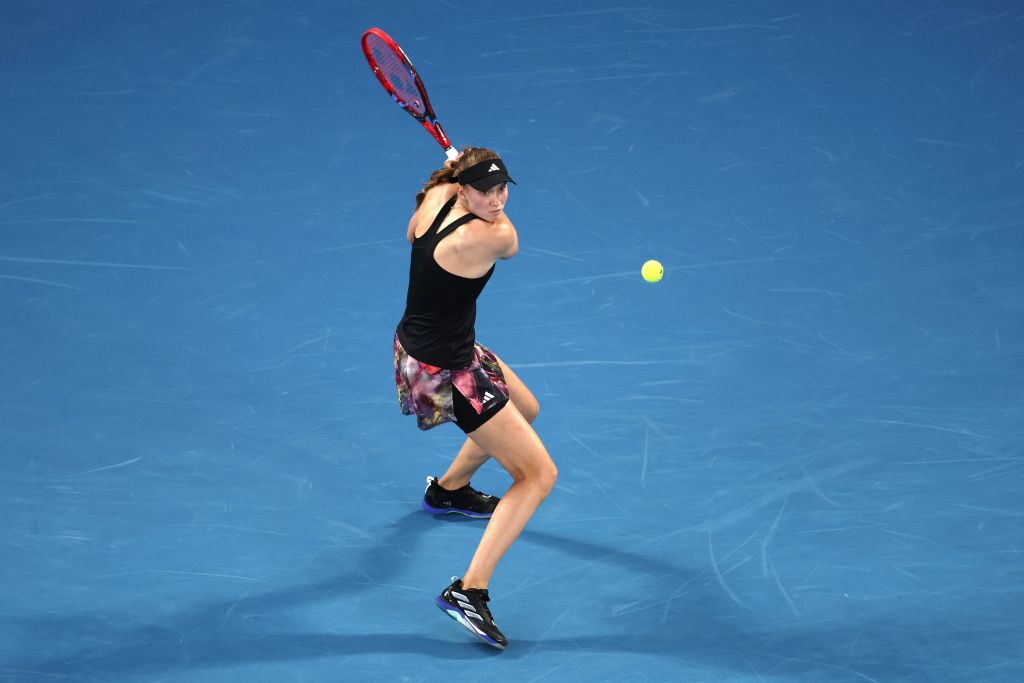Elena Rybakina is closing the gap between her elegantly bruising tennis and the little number next to her name. Last year she won Wimbledon, as impossible as that is to discern from her current No. 22 seeding at the Australian Open. That discrepancy can be attributed to the tour's decision to not award ranking points at Wimbledon, because the tournament decided not to allow Russian or Belarusian players to compete.
The 23-year-old Rybakina actually sunk in the rankings after this career-best accomplishment. Some fruits of her labor did arrive as usual—a trophy, permanent glory, £2,000,000—but she did not enjoy a bump in seeding, which would've insulated her from facing other top players too early in tournaments. Partially due to that glitch, her results have been ho-hum since Wimbledon. Rybakina's court assignments at this tournament have also been tailored for a No. 22 seed, not a reigning Slam winner, though she doesn't seem to care. On some level it's gratifying to see the introverted champ validate last summer's win with a final appearance at the Australian Open, after she defeated Victoria Azarenka, 7-6(4), 6-3, in their semifinal on Thursday.
The serve that carried Rybakina through Wimbledon has similarly bamboozled her opponents in Australia. She has 44 aces in the tournament, leading all women, though that undersells how many times a returner happened to get futile strings on the ball. Instead, here are the tallies of Rybakina's unreturned serves in each successive round of the tournament: 20, 20, 33, 18, 29, and 25. These are matches of roughly 100-140 points total, and she's been able to claim a chunk of them with a single stroke. Her coach Stefano Vukov, whose prickish antics in the player's box clash with Rybakina's serene presence on court, has said that it was the reward for four offseasons of work. "We shortened the motion biomechanically, tried to make it as ‘manly’ as possible, more explosive and powerful," he said in an interview with the outlet Tennis Majors. "Once you serve over 180 km/h consistently, it doesn’t even matter where you serve, you can see that the other players have trouble with it. We’ve seen it with Swiatek, and when the speed is connecting with precision, it is unreturnable."
Vukov was referring to Rybakina's fourth-round upset of the WTA's top dog, Iga Swiatek. The clash wouldn't have occurred so early under standard seeding, but effectively blew open the draw. It was the first meeting of their careers, pitting possibly the tour's best server against its definite best returner, and Rybakina won out, 6-4, 6-4. The throughline of her game is economy of movement, and nowhere is that clearer than her backhand, which looks as if she chiseled away all the excess movement and left only the bare essentials of the stroke, hitting it with enviably perfect timing.
Rybakina has enough game to overcome even when her serve isn't quite clicking. That was the case during her semifinal against Azarenka, a fabulous returner who was hoping to add to a pair of Australian Open wins from a decade ago. Rybakina was broken three times, and after the match noted that her serve wasn't generating as many free points at night as it did during hot daytime conditions, when the ball moves faster off the bounce. It didn't matter. She played steadier during the tiebreak and ran away with the second set, notwithstanding a hiccup at the tail end.
That was Rybakina's third consecutive opponent with a major title. The path ends on Saturday, in a final against Aryna Sabalenka, who has yet to drop a set. Winning that would put Rybakina at No. 8 in the world, somewhere closer to where she belongs.





